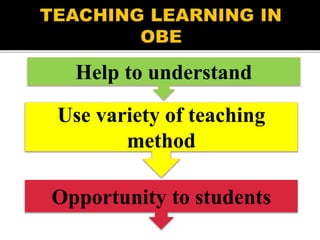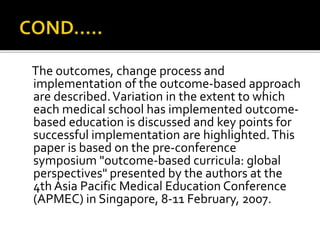Outcome based education
- 4. It is a student–centered learning philosophy that focuses on emperically measuring students performance ,which is called outcome. It is a method of curriculum design and teaching that focuses on what students can actually do after they are taught.
- 6. Focuses on out come of education Enhances learning process Matches with social requirements Based on fast technological development Focuses on learner’s cometency Assess learning experience related to all domains
- 8. TEACHING LEARNING IN OBE
- 9. . Teaching to personal closure Prepare students adequately Create positive learning environment
- 10. Help to understand Use variety of teaching method Opportunity to students
- 11. STUDENTS ROLE IN OBE
- 12. Do more challenhing task  Be creative Analysis ans synthesise information Work as a team Task based skill development
- 14. ÔÉò OBE to ensure quality education ÔÉò National frame work for education by quality assurance department
- 16. ÔÇ° It encourages participation and collaboration from multiple disciplines and interest groups in planning and implementing the curricula which will foster learning in various areas of medical practice. ÔÇ° OBE to promote more self-directed learning and allow students to have a metacognitive understanding of the educational program and their role in that process.
- 17.  It also encourages active discussion of those goals and the values they embrace.  relevance to the students’ future practice.
- 18. ÔÇ° Inclusion and emphasis on attitudes and values in stated outcomes is inappropriate . ÔÇ° They also claim that the OBE approach does not permit special, lower standards for students who have been badly served by public education in the past. ÔÇ° Some teachers find their grading workload significantly increases in OBE curriculum.
- 20. ÔÇ° Abstract Outcome-based education is one of the most significant global developments in medical education in recent years.This paper presents four case studies of outcome-based education from medical schools in different parts of the world; Scotland; USA; Pakistan; and Singapore. The outcome-based curricula have either been in place for some time, are evolving or are at the planning proposal stage.
- 21. The outcomes, change process and implementation of the outcome-based approach are described.Variation in the extent to which each medical school has implemented outcome- based education is discussed and key points for successful implementation are highlighted.This paper is based on the pre-conference symposium "outcome-based curricula: global perspectives" presented by the authors at the 4th Asia Pacific Medical Education Conference (APMEC) in Singapore, 8-11 February, 2007.
- 22. 1. Sankaranarayana,”Learning and teaching nursing ”, 3rd edition, Brainefil publications, page no:159-162 2. BT.Basavanthappa, ”Nursing education”,1stedition, Jaypee publications, page no:283 3. Pramilaa R, ”Nursing communication and educational technology”,1stedition, Jaypee publications , page no:281-286 4. K P Neeraja,”Text book of nursing education”,1st edition , Jaypee publications, page no:201
- 23. ÔÇ° https//library.educause.edu>comp.edu ÔÇ° https://en.m.wikipedia.org>wiki>comp ÔÇ° www.competencyworks.org>about>comp ÔÇ° www.ed.gov>oii-news>competency-based education Journals ÔÇ° Journal of teacher education ÔÇ° Journal of competency based education ÔÇ° Journal of interprofessional care
























